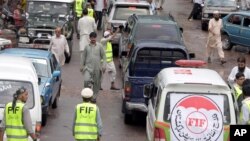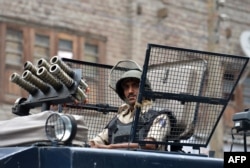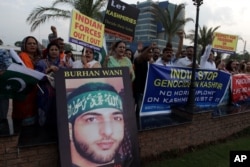Hundreds of activists, blocked while trying to deliver an Islamist charitable organization’s relief supplies and ambulances from Pakistan to India in the disputed Kashmir region, staged a sit-in Wednesday in protest.
The activists belong to the Falah e Insaniat Foundation, which the United States has designated a terrorist organization. Pakistani authorities on Tuesday had stopped their convoy – of 20 trucks loaded with relief supplies, along with 12 ambulances – at the border town of Chakoti. It’s near the Line of Control dividing Kashmir between Indian- and Pakistani-administered sections.
Authorities had told the FIF activists to wait for clearance from the Indian side, said Ghulamullah Azad, who oversees the charity’s activities in Muzaffarabad, capital of the Pakistani-managed part of Kashmir.
Demonstrators on Wednesday demanded that the United Nations or Red Cross take the convoy items to the Indian side.
Kashmir, claimed by both India and Pakistan, has been the source of at least three wars between the nuclear rivals. Some Kashmiris say they would like independence from both countries.
Recent attacks
The Indian side has seen a wave of violence since Indian security forces killed a young, popular militant commander last month. Clashes between rock-throwing youth and security forces have left dozens dead. The Indian government has declared curfew in parts of the scenic valley and restricted movement and assembly in the rest.
FIF is closely linked to Pakistan-based Lashkar e Taiba (LeT), a group blamed for a series of 2008 attacks in the Indian port city Mumbai that left 166 dead, including several foreigners. LeT has been declared a terrorist organization by both the United States and United Nations as well as banned by Pakistan.
The current head of FIF, Hafiz Abdur Rauf, was also a senior leader of LeT and is on the U.S. list of specially designated global terrorists.
Terrorist links
The U.S. State Department considers FIF an alias of LeT. In a news release dated Nov. 24, 2010, announcing the designation, the department said "the United States will not tolerate any support to this organization. LeT has attempted to use FIF as a way to evade scrutiny. This designation will help put to an end that attempted evasion."
Many analysts think Jamaat ud Dawa (JuD), the humanitarian front of LeT, changed its name to FIF to avoid sanctions. JuD leader Hafiz Saeed, also closely linked to FIF, has been declared a terrorist by both the United Nations and the United States. The U.S. has offered a $10 million reward for information leading to his arrest.
Mysterious relationship with Pakistan
JuD’s legal status in Pakistan is shrouded in mystery. The government has not categorically banned it, like its parent organization LeT. Islamabad has said it has fulfilled the country's obligations as a U.N. member state by freezing the group's assets and banning its members from travel.
The Pakistani Electronic Media Regulatory Authority recently banned coverage of JuD activities, stating the organization was on the U.N. list of terror groups.
The United States contends the money raised through FIF in the charity's name also goes to fund terrorist activities, especially against India.
However, the organization seems to enjoy state patronage in Pakistan. According to Pakistan’s English-language Dawn newspaper, FIF was among the first organizations allowed to set up relief camps when people displaced by fighting in the country’s northern tribal areas started returning home in 2014.
“The Pakistan Army is really cooperative toward us,” Mohammad Sarfaraz, the camp's chief organizer, told Dawn. “We were the first ones to set up a greeting camp to receive" internally displaced people, "even though that area was in the red zone."
Many NGOs complain that while the government requires them to apply for certificates before they can provide disaster relief, charities such as FIF, with links to militancy or extremist ideology, are allowed to operate freely.
This, they say, help such groups not just raise money for their activities, but also generates goodwill to help with their recruitment efforts.
Roshan Mughal contributed to this report from Muzaffarabad and Chakoti.






